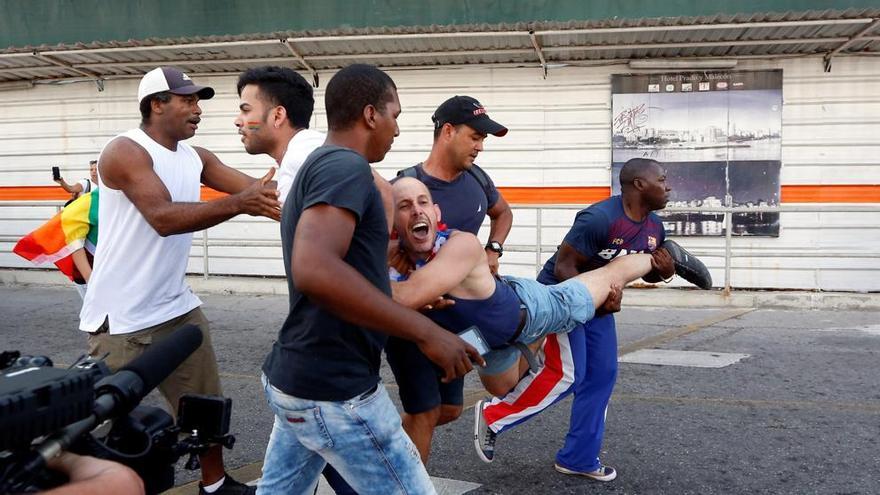
![]() 14ymedio, Reinaldo Escobar, Havana | 25 November 2019 — The incessant creativity of repressors in Cuba shows the tendency to seek legal formulas that justify, or at least explain, the harassment to which those who, not satisfied with simply thinking differently, manifest this thinking in some way.
14ymedio, Reinaldo Escobar, Havana | 25 November 2019 — The incessant creativity of repressors in Cuba shows the tendency to seek legal formulas that justify, or at least explain, the harassment to which those who, not satisfied with simply thinking differently, manifest this thinking in some way.
To those who practice independent journalism they apply Article 149 of the Criminal Code whose original purpose was to punish those who “perform acts of a profession for whose exercise they are not duly authorized.”
Meanwhile, the detainee who causes damage to the knuckles of a police officer with his body is accused of an attack under Article 142; and the one who defends himself against a pair of stocky young men who, without identifying themselves, force him into a car, is accused of resistance based on Article 143.
The most recent innovation now appears to be to punish those who leave their homes without knowing that they have a State Security operation around their residence: they are fined for a non-existent contravention called “violating the police cordon.”
At least that was the verbal explanation they gave Nancy Alfaya, an activist for the Women’s Equality Network, when she was released from her most recent detention at a police station last week.
The fine, which reaches 100 pesos, is covered in Subparagraph H of Article 2 of Legal Provision 141. This text was signed in March 1988 by Fidel Castro himself and his then Minister of the Interior, José Abrantes.
What does this legal section really say?
The aforementioned Article 2 sanctions those who contravene the norms of collective security, and in particular its Subsection H cites: “destroys, deteriorates or suppresses the security devices that prevent the commission of crimes.” Violators are fined “100 pesos and the obligation to restore them [the devices], repair them or pay their cost.”
Obviously it is designed to protect the physical integrity of fences, containment barriers, lighting, cameras and other accessories installed “to prevent the commission of crimes.” It does not include the act of mocking (consciously or unconsciously) the agents who comply with the order not to let a citizen leave their home.
Article 9 of that text clarifies that it is the members of the National Revolutionary Police who are empowered to impose fines and other measures. In the case of Subsection H, the officials of the Physical Protection body of the Ministry of Interior are included.
Appeals that are filed “will be resolved by the head of the municipal unit of the National Revolutionary Police corresponding to the place where it was committed” or, and it’s the same thing, the appeal is resolved by the culprit.
The recent enactment of Decree Law 389, published this November 18 in the Official Gazette, which regulates covert investigation techniques, includes among other details the interception of communications and the installation of hidden cameras and microphones.
If the legislative fantasy of the Government continues in progress, we are probably on the eve of seeing the film prophecy made in 2004 by the director Eduardo del Llano in his fiction short film called Monte Rouge come true, in which an agent appears at Nicanor’s house with a shocking announcement: “I come to install the microphones.”
If a citizen without a criminal record, without being subjected to an investigation or judicial process is fined because a practically invisible fence is ignored, now it is expected that the political police have the ability to fine those who speak softly or use cryptic language when talking on the phone to obstruct, in their own homes, the devices that they discover.
Luckily, imagination is not a monopoly of the repressors.
__________
COLLABORATE WITH OUR WORK: The 14ymedio team is committed to practicing serious journalism that reflects Cuba’s reality in all its depth. Thank you for joining us on this long journey. We invite you to continue supporting us by becoming a member of 14ymedio now. Together we can continue transforming journalism in Cuba.
